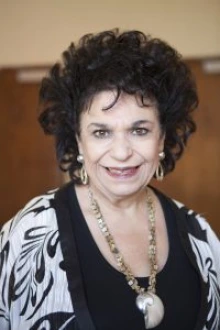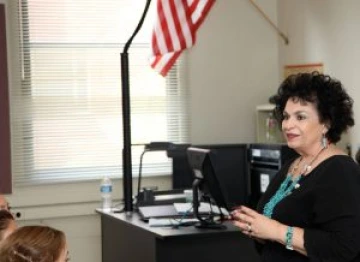The National Center for Interpretation Testing, Research and Policy (NCI) is a research and outreach unit at the University of Arizona charged with promoting intercultural communication and social justice for language minorities through cutting-edge research, training, and testing for interpreters and translators while advancing professionalism.
Founded in 1979, NCI is dedicated to ensuring language access to Limited-English Persons. We offer a variety of services, including interpreter training and testing in both the legal and medical fields, and self-study materials to ensure interpreters reach a level of excellence required by the field. In addition to that, NCI offers translation and conference interpretation services, as well as customized language-access plans for schools, hospitals and any organization looking to ensure the rights granted by Title VI are provided.
Our Founder

We at the National Center for Interpretation are extremely proud to have had the privilege of serving the interpreting community for over 30 years. Our founder and past Director, Dr. Roseann Dueñas González, has been an unwavering advocate for language access for limited- and non-English speaking populations has defined the field of professional interpreting. Her groundbreaking work in creating medical and legal interpreter testing and training curricula and standards that promote quality language services signify lasting contributions to the body of knowledge and will undoubtedly continue to guide the profession well into the future.
In honor of the history of NCI, we would like to share a brief history of her illustrious career. Her work began in 1976, when she was called upon by the late Judge Ben Birdsall of the Arizona Superior Court in Pima County, Tucson, Arizona to assist him in identifying those defendants who truly needed an interpreter. This question became the basis of her doctoral dissertation, a work that subsequently became the foundation of federal court interpreter testing by the Administrative Office of the United States Courts (AOUSC) after the Court Interpreter’s Act was passed in 1978. Dr. Gonzalez’ research findings were utilized to develop the Federal Court Interpreter Certification Examination (FCICE), for which she was the primary consultant and lead developer of the process to assess and certify federal court interpreters in Spanish, Navajo, and Haitian Creole. From 1985 through 2000, Dr. Gonzalez directed the Federal Court Interpreter Certification Project at the University of Arizona under contract to the AOUSC. With the assistance of Victoria F. Vásquez, John Bichsel, and a national panel of consultants and experts, Dr. González led the stringent development and validation processes for the FCICE and ensured the reliable administration of the written and oral certification examinations for the AOUSC. Dr. González’ interpreter testing model revolutionized the field of high-stakes, professional interpreter testing and set the standards for the entire court interpreting profession. Today, it remains the standard in the field for interpreter certification at the state and federal levels. In addition to her work with the FCICE, Dr. González is responsible for a wide variety of grants and projects to formally certify and train legal and medical interpreters and direct service providers at the city, state, and federal levels in Spanish, ASL, Cantonese, Navajo, and Inupiat, among other languages. Her work in interpreter assessment has dramatically expanded valid high-stakes interpreter testing and training across many regions, cultures, and professional spheres.
In 1983, Dr. González founded the three-week Summer Institute for Court Interpretation, and in 2002 created the Medical Interpreter Training Institute, which are now known as the Agnese Haury Institutes (AHI) in recognition of the commitment and generous financial support of Tucson philanthropist Agnese Haury. The AHI Court Interpreter Training Institute (CITI) and Medical Interpreter Training Institute (MITI) continue to provide training in the comprehensive knowledge and skills required to meet the rigorous performance standards required for competent legal and medical interpretation. Dr. González’ CITI and MITI curricula allowed NCI to deliver two- and three-day training workshops across the nation for legal, medical, and immigration interpreters and translators, bringing the highest quality professional development available to interpreters in all fields and dramatically improving language access for linguistic minorities.

Another one of Dr. González’ most impactful contributions has been a series of four federal Fund for the Improvement of Postsecondary Education (FIPSE) grants from 2000 through 2013. These four programs include: (1) the development of 3-week intensive translation and interpretation program (the Professional Language Development Program) for bilingual high school students to develop their cognitive academic language proficiency in Spanish and English and motivate them to attend postsecondary education and major in translation and interpretation or any academic program (this transformative program has become on an ongoing summer program at the UA); (2) the development, in-service training, pilot testing, and implementation of a comprehensive translation and interpretation curriculum for middle school and secondary school students to develop their Spanish heritage language and cultural skills (Preparación); (3) the development of an online in-service training on the essential pedagogy of translation and interpreter education (Preparación Online) to prepare middle and secondary teachers to deliver this innovative translation and interpreting curriculum; and (4) the creation of an undergraduate degree at the UA in legal, medical, community, and business translation and interpretation, an eminently successful academic program that is one of very few in the country (the Arizona Initiative to Improve Latino access and Academic Success. As a result of Dr. González’ implementation of these four FIPSE grants, Latino students in Arizona and nationwide recognize the cultural and practical value of their bilingual abilities and also achieve a newfound appreciation of education, as attested to by better academic performance, improved matriculation rates, and participation in postsecondary education.
Her capstone contribution to the field of court interpretation is the 2012 publication of the second edition of Fundamentals of Court Interpretation: Theory, Policy and Practice. After Dr. González and her co-authors published the first edition in 1991, it quickly became the bible for practitioners and stakeholders in the field of legal interpretation. The second edition will be even more so, with expanded and updated chapters on new legislation, legal protocols, and language policy, and new chapters on the language rights and how judges and attorneys should use interpreters. Weighing in at 1,539 pages, Fundamentals 2012 is destined to remain the go-to reference in the field, and we are grateful for Dr. González for all her efforts and sacrifice as she steered it to publication.
NCI could not have made such an impact to our profession without the support of past and current interpreters, the many core and associate faculty members of the Agnese Haury Institute, other interpreter trainers, translation and interpretation researchers, fellow linguists, judges and legal staff of numerous state courts, legal practitioners and scholars, members of the judiciary, the federal courts, the AOUSC, the Texas Department of Assistive and Rehabilitative Services, and numerous other agencies and friends of NCI and the AHI institutes for their work in moving this field forward. Foremost, we are so grateful to Ms. Agnese Haury for her magnificent vision, interest, generosity, and unflagging support of NCI and Dr. González.

